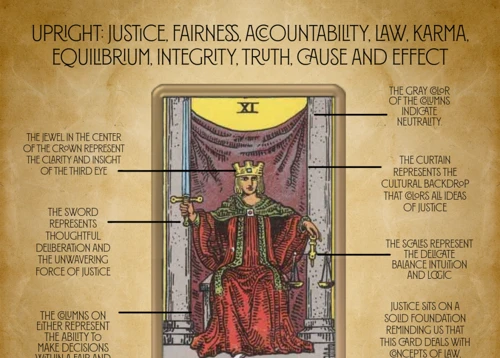Have you ever found yourself struggling to make a fair and balanced decision? The Justice card of the Tarot deck can provide valuable guidance in such situations. Representing the ideals of balance, fairness, and equality, the Justice card encourages us to carefully weigh our options and consider the consequences of our decisions. In this article, we will explore the symbolism and interpretation of the Justice card, as well as discuss how to bring balance and fairness into our decision-making process. Additionally, we will examine various combinations of the Justice card with other Tarot cards, providing further insights and guidance. Whether you are new to Tarot or a seasoned reader, the Justice card offers a powerful message of finding equilibrium in our choices and ensuring fairness in our actions. So, let us delve into the world of the Justice card and discover its profound wisdom.
Contents
The Meaning of the Justice Card
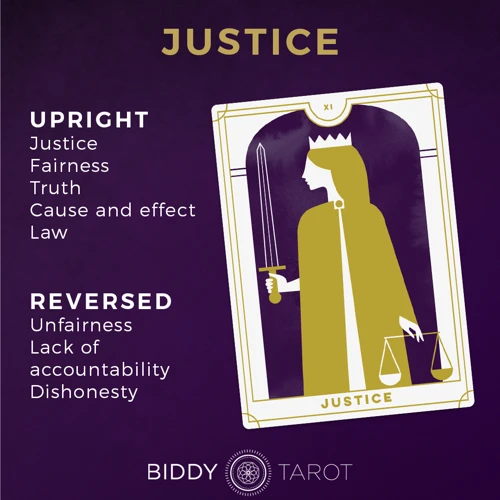
The Justice card in the Tarot deck embodies profound meanings that transcend mere notions of fairness and balance. With its striking imagery of scales and a seated figure, the Justice card symbolizes the core principles of justice and truth. It reminds us to strive for equilibrium in our decisions, considering both the logical and emotional aspects. The Justice card signifies the need for objective judgment and integrity, urging us to seek truth and act with utmost fairness. It prompts us to examine the consequences of our choices and align them with our values. By incorporating the Justice card into our readings, we gain valuable insights into the importance of finding balance and fairness in decision-making processes. So, let us explore the depths of this card and unravel the wisdom it holds, guiding us towards a path of profound understanding and harmonious choices.
The Symbolism of the Justice Card
The symbolism of the Justice card in the Tarot deck is rich with meaning and significance. Central to this card is the image of a female figure seated on a throne, holding a pair of scales in one hand and a sword in the other. The scales represent the scales of justice, signifying the importance of fairness and balance in decision making. They remind us to carefully weigh our options and consider all relevant factors before making a judgment. The sword held by the figure represents truth and clarity, suggesting that decisions should be made based on objective facts rather than personal biases.
The woman’s attire, typically adorned with a flowing and regal robe, symbolizes the authority and power associated with justice. It highlights the importance of making decisions with a sense of authority and responsibility.
The Justice card often features a blindfolded figure, representing impartiality and the need to make unbiased judgments. This blindfold suggests that justice should be blind, treating all parties equally and without favoritism. It emphasizes the need to set aside personal emotions and prejudices when making important decisions.
The setting of the Justice card is often depicted as a serene and balanced environment, evoking a sense of order and harmony. This setting reinforces the idea that decisions should be made in a calm and rational manner, without being swayed by external influences or distractions.
The symbolism of the Justice card encourages us to seek fairness, balance, and impartiality in our decision-making process. By embracing the qualities embodied in the Justice card, we can approach our choices with integrity and ensure that our actions align with our personal values and a sense of justice. If you want to explore other Tarot cards related to decision making, you can check out The Star Card, which offers insights into finding hope and inspiration in decision-making, or The Wheel of Fortune, which emphasizes the importance of embracing change for better decision making.
Interpreting the Justice Card
When it comes to interpreting the Justice card in a Tarot reading, it is essential to consider its core symbolism and the context of the surrounding cards. The Justice card represents fairness, balance, and impartiality, serving as a reminder to make decisions based on logic and reason. It signifies the need to weigh all aspects of a situation before coming to a conclusion. The Justice card often appears when there is a need for accountability and fairness in a particular situation. It may suggest that a decision or judgment is imminent, and it is essential to approach it with objectivity and integrity. In a reading, the Justice card may also indicate the need to consider the consequences of our actions and make choices that align with our inner sense of right and wrong. It advises us to seek justice and truth and to stand up for what we believe is fair. When combined with other cards, such as the Tower card, the Justice card can provide a deeper understanding of the need to embrace unexpected changes and upheavals, while still maintaining a sense of balance and fairness throughout the process. Interpreting the Justice card requires careful analysis of its symbolism and consideration of its placement within the Tarot spread to gain insight into the importance of fairness and integrity in decision-making processes.
Bringing Balance to Decision Making
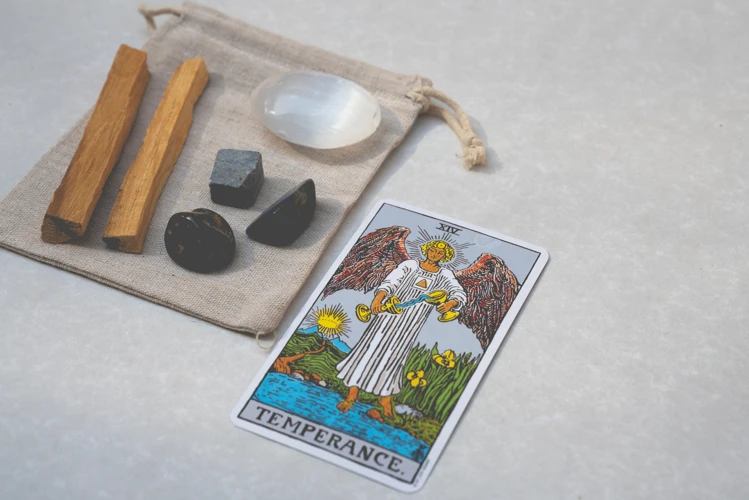
Finding balance in decision making is crucial for making well-informed and thoughtful choices. The Justice card serves as a gentle reminder of the significance of equilibrium in our lives. To bring balance to our decision-making process, understanding the principles of balance is essential. This involves considering all factors involved, weighing the pros and cons, and taking into account both our rational and intuitive faculties. By creating a clear and structured framework, we can assess the situation objectively and make choices that align with our values and goals. Applying balance to decision making requires us to step back and examine the bigger picture, looking beyond immediate desires or fears. It involves embracing unexpected changes, letting go of attachments, and embracing the unknown. This process can be challenging, but the rewards are immense. It allows us to navigate through life with a sense of clarity and discernment, leading to better outcomes and personal growth. So, let us dive deeper into the realm of balance and discover how the Justice card can guide us in embracing the ever-changing landscape of decision making.
Understanding the Principles of Balance
- Harmony: The first principle of balance is harmony, which refers to the state of equilibrium and peace. In decision making, it is essential to consider how our choices align with our values, goals, and overall well-being. By striving for harmony, we ensure that our decisions contribute to our personal growth and fulfillment.
- Weighing options: Balance requires us to carefully weigh our options before making a decision. It is crucial to consider both the short-term and long-term consequences of our choices. This process involves assessing the potential risks and benefits, as well as understanding the impact on various aspects of our lives, such as relationships, career, and personal development.
- Flexibility: Another principle of balance is flexibility, the ability to adapt to changing circumstances. Decision making often involves unforeseen challenges and unexpected changes. By remaining open-minded and adaptable, we can adjust our choices to align with new information or circumstances, ensuring that our decisions remain balanced and relevant.
- Intuition: While logic plays a vital role in decision making, balance also involves listening to our intuition. Our inner wisdom can provide valuable insights and guidance when faced with difficult choices. Trusting our gut feelings and intuition allows us to make balanced decisions that resonate with our deepest selves.
By understanding and embracing these principles of balance, we can approach decision making with clarity and confidence. It allows us to navigate through life’s complexities with a sense of equilibrium, making choices that align with our values and bring us closer to our desired outcomes. Striving for balance in decision making helps us maintain a sense of inner peace and fulfillment, fostering personal growth and transformation.
Applying Balance to Decision Making
To effectively apply balance to decision making, it is crucial to consider various factors and viewpoints. The Justice card reminds us that decisions should not be driven solely by personal biases or emotions, but rather by an objective assessment of the situation at hand. One way to achieve this is by gathering relevant information and examining it from different angles. This means considering the facts, seeking different perspectives, and assessing the potential impact of each option. Taking a step back from our initial inclinations and approaching the decision with impartiality can help ensure a balanced outcome. Additionally, it is important to identify and acknowledge any potential biases or preconceived notions that may cloud our judgment. By recognizing and addressing these biases, we can make more informed and equitable decisions. Another aspect of applying balance to decision making is considering the long-term implications of our choices. It entails reflecting on the potential consequences and weighing the impact on all parties involved. This approach aligns with the idea of karma or cause and effect – understanding that our decisions have ripple effects and can shape the future. By embracing the concept of balance, we can strive for decisions that are fair, just, and considerate of all stakeholders. The Justice card invites us to embrace this practice and make decisions that align with our values and the principles of equity. Embracing this perspective can lead to more fulfilling outcomes that promote personal growth and positive change. So, the next time you face a decision, recall the teachings of the Justice card and seek to apply balance in your discernment process. By doing so, you can navigate the complexities of decision making with wisdom and integrity.
Finding Fairness in Decision Making
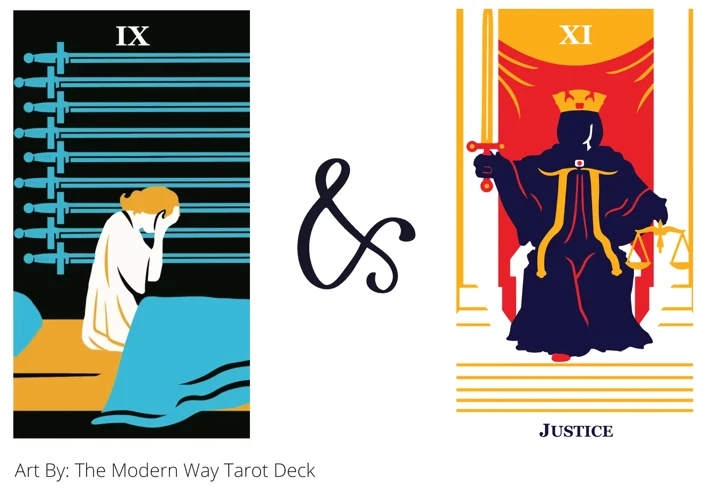
When it comes to decision-making, finding fairness is crucial in ensuring just outcomes. The Justice card serves as a guiding light in this pursuit, reminding us to consider all perspectives and factors involved. One way to cultivate fairness is by actively seeking diverse opinions and collecting relevant information before reaching a conclusion. This can be achieved by engaging in open and honest communication, actively listening to others, and valuing their input. Evaluating decisions from a place of empathy and compassion further promotes fairness, as it takes into account the potential impact on others. The Justice card encourages us to set aside personal biases and prejudices, and instead, embrace a more objective and equitable approach to decision-making. In doing so, we can foster an environment where fairness prevails and outcomes are not only just but also in alignment with our values and principles. Incorporating the essence of the Justice card empowers us to make decisions that are both equitable and thoughtful, ensuring that fairness remains at the core of our choices.
The Role of Fairness in the Justice Card
When exploring the Justice card in the Tarot deck, it is imperative to understand the significance of fairness. Fairness plays a pivotal role in the Justice card, as it embodies the principle of treating others justly and equitably. The card reminds us that fairness is not only an external concept but also an internal state of mind that guides our decision-making process. Fairness requires us to set aside biases, prejudices, and personal interests to make impartial judgments. It prompts us to consider the perspectives and needs of all involved parties, ensuring that no one is overlooked or disadvantaged. By upholding fairness, the Justice card emphasizes the importance of ethical behavior and morality in our choices. It reminds us that fairness is not a mere abstract concept but a guiding principle that lays the foundation for a just and harmonious society. Incorporating fairness into decision-making processes can lead to outcomes that promote greater harmony, understanding, and compassion. So, let us embrace the wisdom of the Justice card, recognizing the vital role that fairness plays in our pursuit of truth and justice.
Remember, the Justice card is just one piece of the Tarot puzzle. To gain a deeper understanding of the interconnectedness of the cards, you may find it beneficial to explore the concepts presented in the Tower card. Both cards encourage introspection and a willingness to embrace unexpected shifts and changes in our lives, ultimately guiding us towards making more enlightened decisions.
Incorporating Fairness into Decision Making
When it comes to decision-making, fairness plays a vital role in ensuring that our choices are just and equitable. Here are some key ways to incorporate fairness into our decision-making processes:
1. Consider Different Perspectives: To promote fairness, it is crucial to consider various viewpoints and perspectives related to the situation at hand. Take the time to listen and understand different opinions, as they can provide valuable insights and help you make a more well-rounded decision.
2. Gather Sufficient Information: Making fair decisions requires gathering all the necessary information before reaching a conclusion. This includes obtaining facts, seeking expert advice, and conducting thorough research. The more informed you are, the more likely you are to make an unbiased and fair decision.
3. Engage in Self-Reflection: It is essential to reflect on your own biases and prejudices to ensure fairness in decision making. Take the time to examine your own beliefs, values, and assumptions, and challenge any biases that may impact your ability to make fair decisions.
4. Create Fair Evaluation Criteria: Establishing clear and objective evaluation criteria can help ensure fairness in decision making. By defining the parameters used to assess various options, you can minimize subjective judgments and promote a more impartial decision-making process.
5. Seek Input from Others: Inviting input from others can bring diverse perspectives into the decision-making process and reduce the likelihood of bias. Engage in open discussions, encourage feedback, and actively seek input from stakeholders who may be affected by the decision.
6. Consult Ethical Guidelines: When facing complex decisions, referring to ethical guidelines and codes of conduct can provide valuable guidance on how to approach fairness. These guidelines can offer frameworks and principles to help navigate difficult decision-making scenarios.
Incorporating fairness into decision making is not always easy, as personal biases and external pressures can influence our choices. However, by consciously striving for fairness and following these steps, we can ensure that our decisions are grounded in principles of justice and equality. Remember, fairness is not only important for the individuals involved but also contributes to a more just and harmonious society as a whole.
Justice Card Combinations
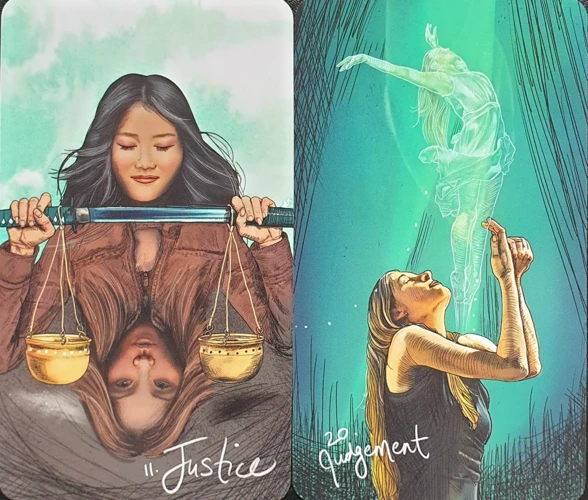
When the Justice card appears in combination with other Tarot cards, its meanings can be further enriched, offering new insights into the decision-making process. In combination with the Swords suit, the Justice card emphasizes the need for rationality and logic in our choices. It reminds us to carefully analyze our options and consider the potential consequences of our actions. When paired with other Major Arcana cards, the Justice card brings a sense of karmic justice and divine intervention. It suggests that the decisions we make have far-reaching consequences and are guided by higher forces. If the Justice card appears in reverse, it may indicate a lack of balance or fairness in decision making. It serves as a reminder to reassess our choices and ensure that we are acting with integrity. The combinations of the Justice card offer nuanced interpretations that enhance our understanding of the complex nature of decision making and the impact of our choices.
Justice with the Swords Suit
When the Justice card is paired with the Swords suit in a Tarot reading, it adds a layer of intellectual rigor and logical thinking to the concept of balance and fairness. The Swords suit represents the realm of the mind, thoughts, and communication. This combination suggests that in order to achieve justice, it is imperative to approach situations with a clear and rational mindset. The Swords suit, with its association with conflict and mental challenges, emphasizes the importance of impartiality and objectivity in decision-making processes.
When Justice appears with the Ace of Swords, it signifies a fair and just decision or opportunity that requires taking swift and decisive action. It indicates the need to use our intellect and analytical skills to make choices based on facts, rather than being swayed by emotions or biases.
With the Two of Swords, Justice encourages us to carefully consider the pros and cons of a situation before making a decision. It reminds us not to be indecisive or avoidant, but instead confront any conflicts or dilemmas head-on, finding a fair and balanced resolution.
When combined with the Three of Swords, Justice suggests the importance of facing emotional pain or heartbreak with honesty and openness. It urges us to find a fair way to heal and move forward, considering the needs and well-being of all parties involved.
In the presence of the Ten of Swords, Justice implies the need to accept the consequences of our actions, even if they are unpleasant or challenging. It urges us to learn from our mistakes, take responsibility, and seek resolution through fair and open communication.
The pairing of Justice with the Swords suit serves as a reminder that fairness and balance require thoughtful consideration, intellectual clarity, and an honest examination of both our thoughts and the impact of our decisions on ourselves and others. By integrating the wisdom offered by Justice and the Swords suit, we can navigate conflicts, make just choices, and approach decision-making processes with objectivity and insight.
Justice with the Major Arcana
When the Justice card combines with the Major Arcana cards in a Tarot reading, it enhances and amplifies the significance of the reading. Each Major Arcana card carries its unique energy and symbolism, and when combined with Justice, it adds layers of depth and complexity to the message conveyed.
The High Priestess, in conjunction with Justice, emphasizes the need to trust one’s intuition and inner wisdom when making decisions. It encourages seeking answers from within and relying on one’s instincts to navigate through challenging situations. This combination signifies a harmonious blend of logic and intuition, leading to wise and just decisions.
When combined with the Emperor, Justice takes on a more authoritative and structured meaning. The Emperor represents power, authority, and order, and when paired with Justice, it suggests the importance of making fair and balanced decisions in positions of leadership. This combination encourages taking a disciplined and unbiased approach in making judgments that affect others.
The Hermit, when combined with Justice, highlights the need for introspection and contemplation before making a decision. It suggests taking time to withdraw from the outside world and reflect on one’s values and principles. This combination encourages seeking inner guidance and allowing one’s inner light to illuminate the path towards just choices.
The Tower, when paired with Justice, signifies a sudden and unexpected change that disrupts the status quo. This combination suggests that during times of upheaval and chaos, maintaining fairness and balance becomes crucial. It prompts us to adapt and adjust to the changes while upholding justice and integrity.
The combination of the Justice card with the Major Arcana cards offers valuable insights into the intersections of justice and other significant aspects of life. It provides a nuanced understanding of how fairness and balance interact with different energies in various situations. By incorporating these combinations into Tarot readings, readers can unlock deeper meanings and offer more accurate guidance to those seeking clarity and understanding in their decision-making processes.
Justice in Reverse
When the Justice card appears in reverse in a Tarot reading, it signals a disruption or imbalance in the realm of fairness and justice. This reversal suggests that there may be a lack of accountability or dishonesty in decision-making processes. It is important to be cautious and attentive when encountering the Justice card in reverse, as it may indicate the need to reassess our actions and motivations. Here are a few key considerations when interpreting Justice in reverse:
1. Unfairness and Bias: When the Justice card is reversed, it may indicate instances of unfairness, prejudice, or favoritism. It is a reminder to examine our inherent biases and work towards a more just and equitable approach to decision-making.
2. Lack of Accountability: Reversed Justice may signify a lack of accountability or avoidance of consequences. It urges us to take responsibility for our actions and face the outcomes with integrity and honesty.
3. Legal Issues and Delays: In some cases, the Justice card in reverse can point to legal complications, delays, or misjudgments. It is crucial to exercise caution and seek legal advice when faced with such situations.
4. Imbalanced Relationships and Power Dynamics: This reversal can also shed light on imbalanced relationships or power dynamics, urging us to bring fairness into our interactions. It reminds us to consider the effects of our decisions on others and strive for harmony in our relationships.
When interpreting Justice in reverse, it is essential to approach the situation with mindfulness and a willingness to correct any imbalances. It serves as a call to action to reassess our choices, acknowledge our biases, and strive for fairness and equity in all aspects of our lives.
Guidance from the Justice Card
When seeking guidance from the Justice card, it is essential to approach it with an open mind and receptive spirit. This card serves as a compass, pointing us towards making fair and balanced decisions. One aspect of guidance provided by the Justice card is the reminder to trust our inner wisdom and intuition. It encourages us to tap into our intuitive knowing to discern what feels just and right in a given situation. The Justice card also invites us to critically evaluate any biases or prejudices that may influence our decision-making process. It reminds us to remove any personal agendas and strive for objectivity. Additionally, the Justice card reminds us to consider the consequences of our choices not only for ourselves but also for those around us. It urges us to take responsibility for our actions and ensure that they align with our values of fairness and integrity. The Justice card highlights the importance of seeking common ground and finding solutions that benefit all parties involved. It prompts us to listen and understand different perspectives, promoting open dialogue and constructive communication. By embracing the guidance of the Justice card, we tap into a wellspring of wisdom that fosters harmony and justice in our decision-making processes. It encourages us to consider the greater good and make choices that contribute to a more just and equitable world. So, let us embrace the guidance offered by the Justice card and embark on a path of fairness, integrity, and balance in our decision-making endeavors.
Conclusion
The Justice card serves as a powerful reminder of the significance of balance and fairness in decision making. Its symbolism and interpretation provide us with valuable insights and guidance when faced with difficult choices. By understanding the principles represented by the Justice card, such as weighing options, considering consequences, and aligning actions with values, we can bring equilibrium and integrity into our decision-making processes.
Incorporating the concept of fairness into our decision-making not only benefits us but also those around us. Making choices that prioritize fairness and equality fosters trust, strengthens relationships, and contributes to the greater good. The Justice card teaches us that decisions made from a place of balance and fairness have the power to create harmony in our lives and bring about positive change.
Additionally, exploring the various combinations of the Justice card with other Tarot cards allows for a deeper understanding of their interconnected meanings. This knowledge allows us to tap into the wisdom of the Tarot and gain further clarity and guidance in our decision-making processes.
So, as we navigate through the complexities of life, let us keep in mind the lessons of the Justice card. Let us strive for balance, fairness, and integrity in our decision-making, knowing that these values serve as the foundation of a just and harmonious existence. By incorporating the wisdom of the Justice card into our lives, we can find clarity, make sound choices, and contribute to a world that embraces fairness and equality.
In conclusion, the Justice card reminds us that every decision we make has consequences, and it is our responsibility to ensure that those consequences are fair and just. By embracing the ideals of balance and fairness, we can navigate the complexities of decision making with integrity and wisdom, ultimately leading to a more harmonious and fulfilling life.
Frequently Asked Questions
FAQs About the Justice Card
1. What does the Justice card represent in tarot readings?
The Justice card represents balance, fairness, and truth in tarot readings. It calls for impartial judgment and the consideration of both sides of a situation before making a decision.
2. What is the symbolism of the scales in the Justice card?
The scales in the Justice card symbolize the need for balance and objectivity. They remind us to carefully weigh our options and consider the consequences of our actions.
3. How can I interpret the Justice card in a reading?
When interpreting the Justice card, consider themes of fairness, integrity, and accountability. It may indicate a need to make a just decision or to seek justice in a particular situation.
4. How can the Justice card help with decision making?
The Justice card encourages us to find equilibrium in our decision-making process. It reminds us to consider both facts and emotions, weigh our options, and act with integrity to ensure fairness in our choices.
5. What role does fairness play in the Justice card?
Fairness is a central theme in the Justice card. It emphasizes the importance of treating others equitably and making decisions based on moral principles rather than personal bias.
6. Can the Justice card indicate legal matters?
Yes, the Justice card can indeed indicate legal matters in tarot readings. It suggests that legal proceedings may be necessary, and encourages seeking fair and just outcomes.
7. What does it mean if the Justice card appears reversed?
When the Justice card appears reversed, it may indicate a lack of balance or unfairness. It could suggest a need to re-evaluate decisions, seek compromise, or address any biases present in the situation.
8. What are some common combinations of the Justice card with other tarot cards?
The Justice card often interacts with the Swords suit, emphasizing the need for clear communication and unbiased thinking. It may also have significant meanings when combined with other major arcana cards, such as the Tower, the Star, or the Wheel of Fortune.
9. How can I incorporate the principles of balance in my decision-making?
To incorporate the principles of balance into decision-making, take time to reflect on both logical and emotional aspects, consider the potential outcomes, and seek input from different perspectives. Trusting your intuition and aligning decisions with your values can also promote balance.
10. Can the Justice card provide guidance beyond decision making?
Yes, the Justice card can offer guidance in various aspects of life. Its principles of fairness, balance, and integrity can be applied to relationships, personal growth, and navigating challenging situations, providing valuable insights beyond decision-making processes.
